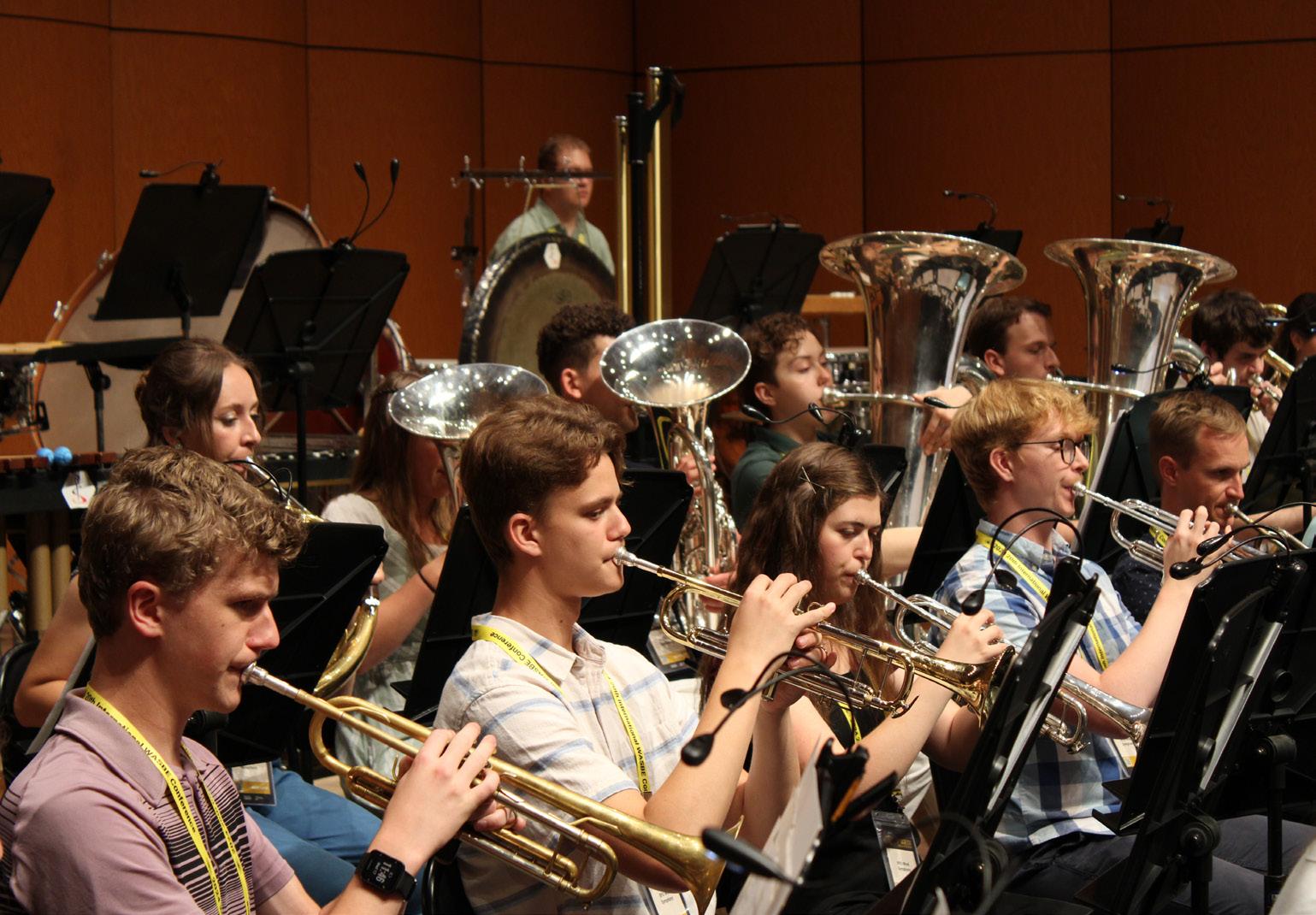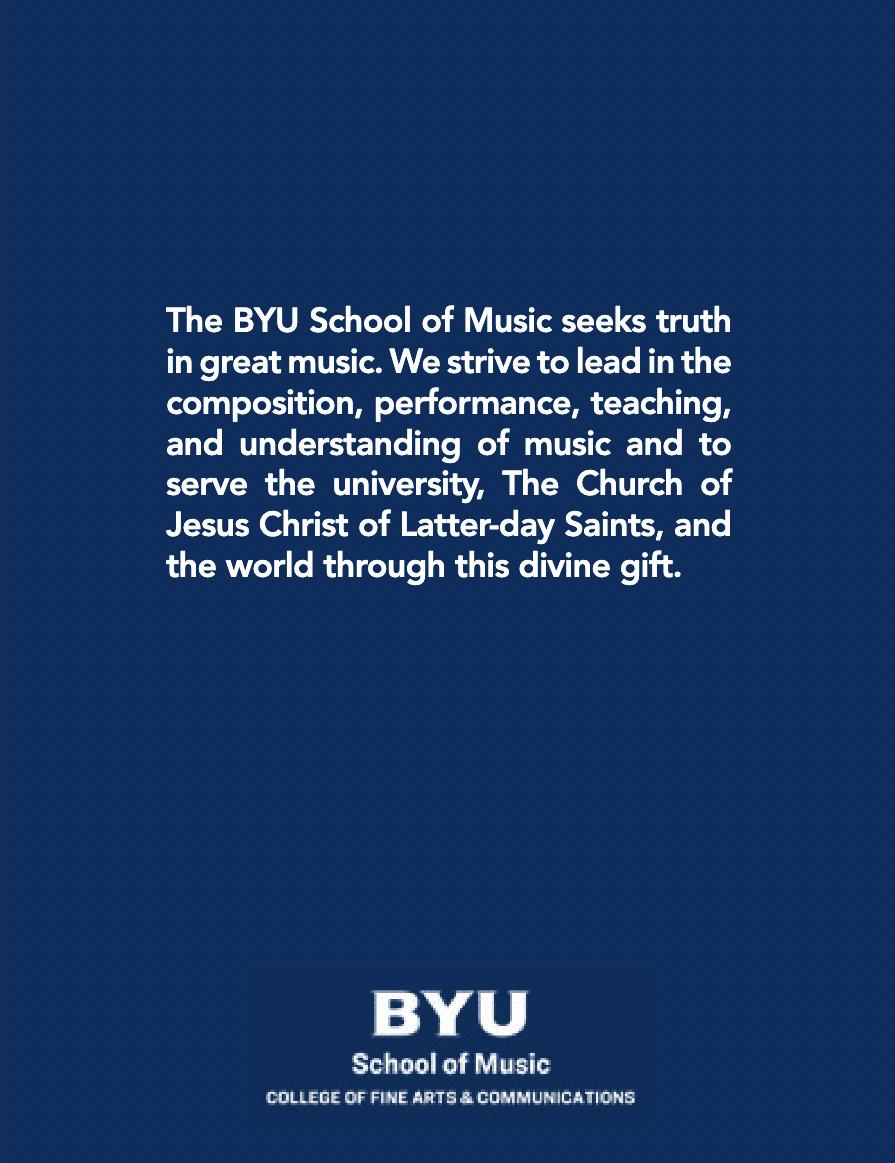






Music has a unique and inherent power to soothe and heal. For centuries, all people from empresses and kings to peasants and commonfolk have turned to music for its comforting and calming effects. Perhaps one of the best-known examples is King Saul’s request for David to play his harp for the king whenever he was beset by a foul spirit. The soothing music helped calm King Saul’s troubled mind and heart.
To some degree or another. either intentionally or inadvertently, we have all heard and been positively influenced by music. The calming strains of a beloved popular or classical musical selection can cause us to “be still” and recalibrate what we are doing and what is important. Similarly, an energetic piece of music can invigorate our souls and minds, urging us to continue on and push through the adversity we may face. These are but two examples of the numerous styles, genres, and moods of music and how they may affect us.
As you peruse this issue of the Journal, you will see the students, faculty, and alumni of the School of Music consistently engaging in creating music that soothes, calms, invigorates, and heals
Through our music, we seek to share the light of Jesus Christ, who can both soothe and heal all wounds and sorrows.
We invite you to allow His light to permeate your life and bring you the comfort and peace needed in today’s world.
Sincerely,
Mark Ammons Assistant Director, BYU School of Music



By Julianna Charlesworth
In the summer of 2005, the Gabriel Trumpet Ensemble was born, bringing together a unique blend of eight trumpets, an organ, keyboard, and percussion. What began as a hobby turned into something more: a significant partnership with the renowned Tabernacle Choir.
After ten years together, founder Brad Omer had considered disbanding the group. However, the members passionately opposed this idea, determined to keep the group together. Their resolve paid off in 2017, when an unexpected opportunity arose.
While serving as a missionary at the Utah State Prison, Mark Chamberlain, a key player in the Gabriel ensemble, crossed paths with Mack Wilberg, the Tabernacle Choir director. Wilberg, who was also involved in the music program at the prison, saw potential in the Gabriel trumpet players and proposed a Christmas concert collaboration with the Tabernacle Choir.
The excitement was palpable when Brad Omer received Wilberg’s invitation. However, securing enough herald trumpets for the performance proved to be a formidable challenge. The
Gabriel ensemble needed eight matching heralds, a rarity that proved elusive. Despite numerous calls to music stores and manufacturers, the instruments were either unavailable or on special order. Brad checked with his friends, but could only find three trumpets total. He said, “I called Summerhays and other music stores. They kind of laughed at me. No one had that many heralds laying around!”
Finding eight matching silver heralds tuned out to be a huge hassle.
Brad’s connections came to the rescue. He reached out to his nephew, Josh Omer, who was part of the 23rd Army Band in Salt Lake City. The band had six herald trumpets that they generously loaned. Luckily, Brad’s friend Seth Miner owned two heralds, which he loaned to the group, bringing Gabriel up to eight herald trumpets.
In preparation for the performance, the ensemble faced a
steep learning curve. Until this point, the group had only played ‘normal’ trumpets—they had never before played heralds. Herald trumpets require specialized techniques, and the players immersed themselves in practice, studying military corps videos and refining their synchronization. With the help of Mark Chamberlain’s home wood shop for rehearsals and
the opportunity to practice in the Conference Center, the ensemble prepared for the big stage.
Gabriel’s debut performance in December 2017 was a whirlwind of excitement. The herald players dazzled in their red coats, black pants, and white gloves, adding a majestic touch to the Tabernacle Choir’s Christmas concert. Brad touched on what was a frenzy of excitement and commotion, explaining the rigor of their schedule: “Wednesday night: dress rehearsal. Thursday night: first performance...Friday: performance. Saturday: big taping session... evening performance. Sunday morning: broadcast... we were floating on cloud nine.” Despite the busy week
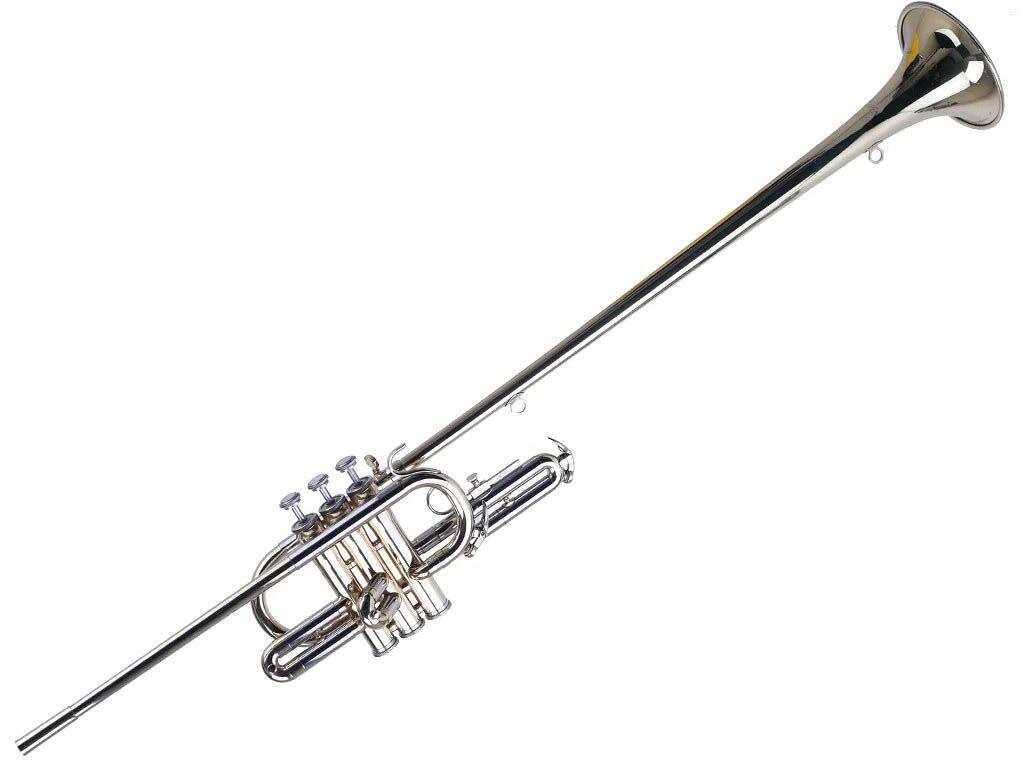
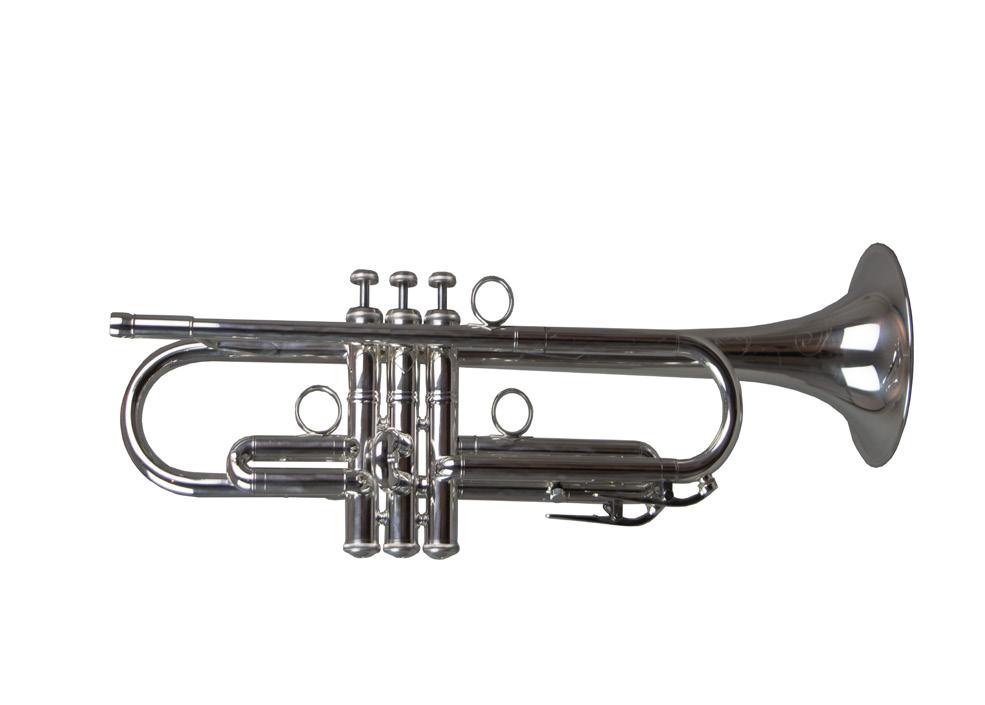
of performances, the event was a resounding success, leaving both performers and audience members elated.
The collaboration between the Gabriel ensemble and the
Tabernacle Choir continued to flourish. In 2018, the herald trumpets returned for another Christmas season, this time with Brad’s son Dan as a backup player and new costumes designed by Sue Allred, this time black and white.
Gabriel and the Tabernacle Choir’s partnership took a significant step forward in 2019 when discussions began about purchasing herald trumpets. After Kanstul, the original chosen manufacturer, went out of business, Brad’s search led him to Shires in Boston to create a custom set of eight herald trumpets. This milestone allowed the Gabriel ensemble to continue their collaboration with the Tabernacle Choir without the need to continually borrow trumpets.
The COVID-19 pandemic in 2020 caused disruptions, but the ensemble returned in 2021 with performances across various venues, including the Murray Symphony Orchestra and the
American Festival Chorus and Orchestra. Their November 2021 appearance on the “Music and the Spoken Word” broadcast marked a significant moment, establishing them as a regular fixture beyond the Christmas season.
The herald trumpets continued to shine in 2022 and 2023, with highlights including the Provo Freedom Festival, the Renaissance Fair, and the Tabernacle Choir’s Christmas concert.
The 2023 Christmas performance featured an exciting new collaboration with Richard Elliott, the Choir’s principal organist, showcasing an energetic arrangement that delighted audiences. Brad explained the significance of this collaboration, saying, “For over 20 years Richard has delighted Christmas audiences with his exciting renditions on the organ, showcasing the power of the instrument, and his supreme talent, all wrapped up in the spirit of the season with new and powerful musical arrangements... This year, he
invited the Heralds to join him. We were, of course, thrilled to do this.”
A small castle had been built for the set, and the organ console was nestled in the bottom of it. The heralders filled the castle, and Brad noted that “The energy level was amazing.”
Many of the key players in the Gabriel ensemble have strong
ties to Brigham Young University. Brad noted that “These are amazing trumpeters, and I’m very proud to be associated with them. These names include what I call the ‘core’ players of Gabriel, along with our wonderful ‘sub’ players.”
Brad Omer, a former lead in BYU’s Jazz Band and an MBA graduate, brings a wealth of experience and dedication to the group. Seretta Hart, a BYU professor and Utah Trumpet Guild
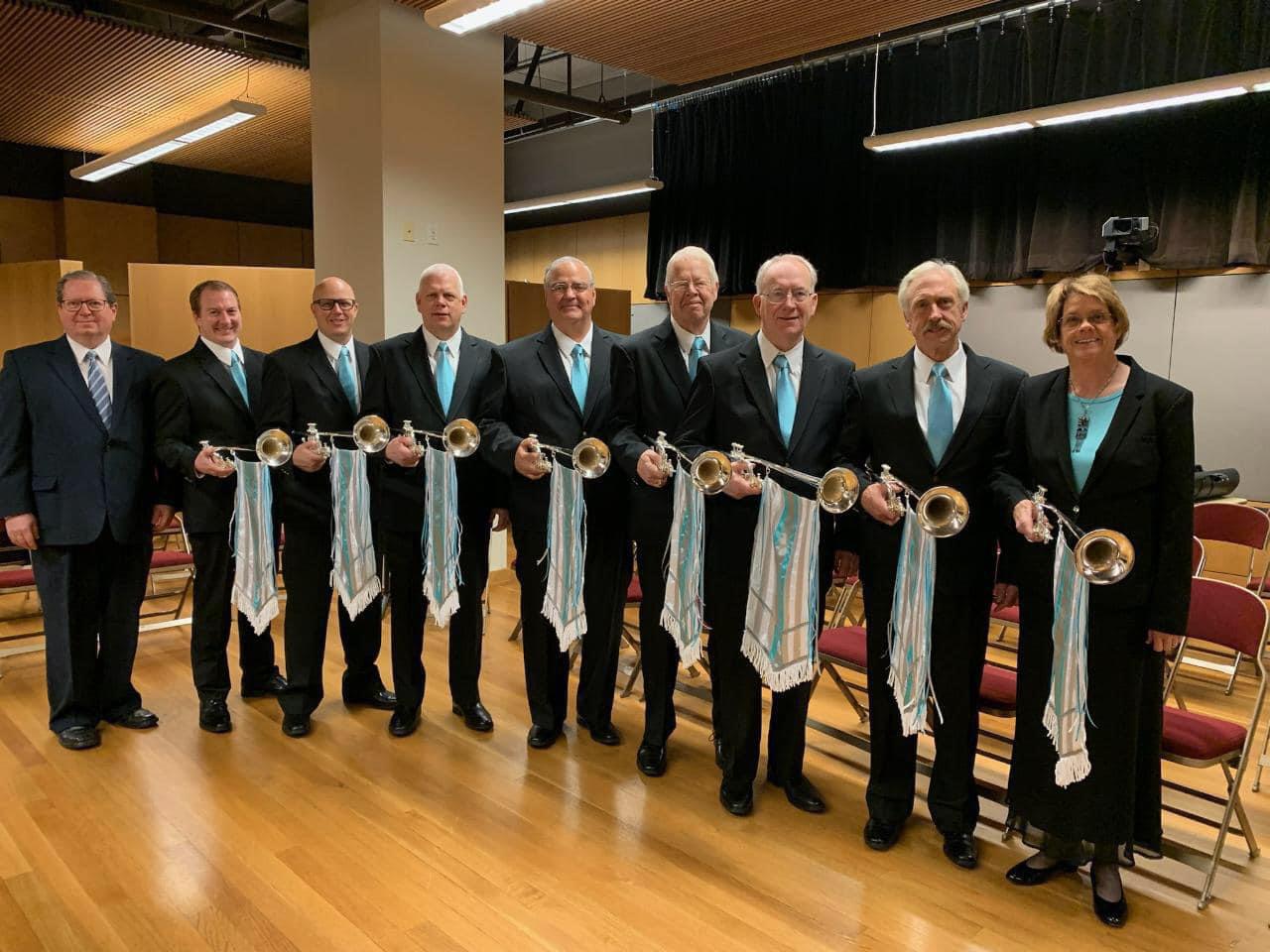
president, has been instrumental in coordinating events with the university. Julie Christofferson got her bachelors and masters’ degrees at BYU, played in all their major ensembles, and recently went on tour for The Sound of Freedom.
Marden Pond attended BYU on a full four-year music scholar ship, is the leader of the Nachtmusik Chamber Orchestra, and was the associate producer for several BYU TV productions. Robert Peterson graduated in 1985 with his bachelor’s degree from BYU, and actively performed and soloed with most of the ensembles at the time. Finally, Daniel Omer graduated from BYU with a french horn performance degree, and soloed in the Philharmonic and Wind Quintets. Each of these members, with their backgrounds in music performance and time at BYU, further enrich the ensemble’s talent pool and BYU’s name on the grand stage. The names of all the members of Gabriel are as follows: Mark
Chamberlain; Seretta Hart; Keith Davis; Shawn Shearer; Julie Christofferson; Marden Pond; Robert Peterson; Craig Ferrin; Ammon Rodabaugh; Daniel Omer; Howard Summers; Evan Bateman; Kenny Yeates; Seth Miner; James Baggaley; Shawn Mangum; Erin Reichert; Mike Raleigh; David Omer; Ted Olson; Brad Omer.
Today, the Gabriel Trumpet Ensemble continues to be an influential presence in the music world, with several upcoming engagements. Gabriel grew significantly from a small hobby group to having their name on a worldclass stage. Brad noted this, stating, “Above all, I continue to be so grateful to Mack Wilberg and the Tabernacle Choir team for helping make this dream a reality. It is a glorious path that I could never have imagined, and we are so happy to be part of it.”
He went on to say, “This herald trumpet phenomenon is amazing, and has given Gabriel new
life. The group is really enjoying it, and I look forward to what ever the future may bring. It’s a thrilling ride, and I’m so grateful for this wonderful adventure!” With a legacy of remarkable performances and a bright future ahead, the Gabriel ensemble remains a testament to the power of music and collaboration.
“I continue to be so grateful to Mack Wilberg and the Tabernacle Choir team for helping make this dream a reality. It is a glorious path that I could never have imagined, and we are so happy to be part of it”
-Brad Omer

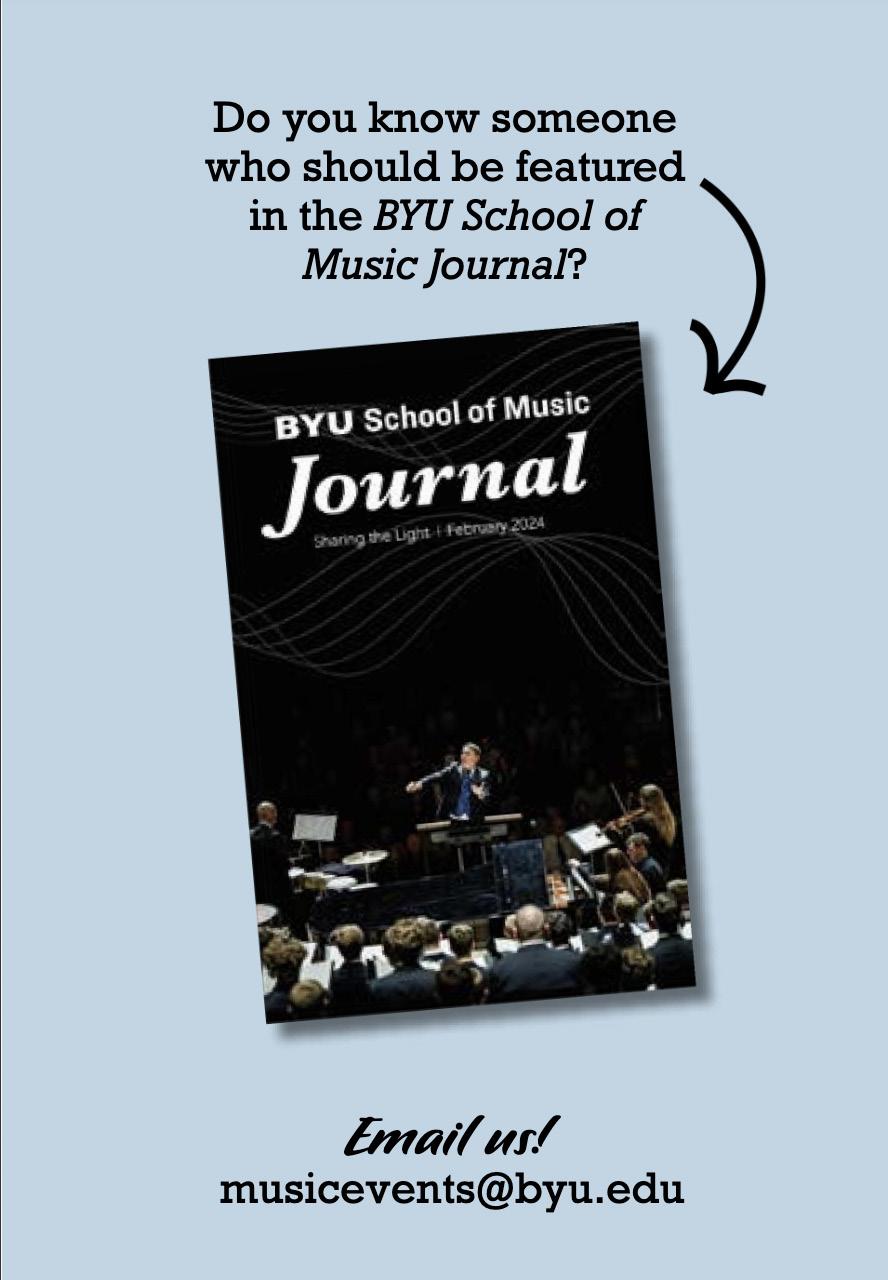

By Sarah Griffin Anderson

J. Scott Rakozy and Peter Murray, two BYU Commercial Music program graduates, were nominated for a Grammy—one of the highest awards in the music industry—for their work on the soundtrack of the Hogwarts Legacy video game, released in February 2023. With a 150 million-dollar budget, it quickly became the best-selling video game of 2023, making over one billion dollars in retail sales.

Hogwarts Legacy was the first time Murray ever worked on interactive media. Most of his work had been composing for television or film with companies like Ace Entertainment, Candlelight Media Group, and Warner Brothers Games. He said, “There is certainly a lot of transferrable knowledge, but the paradigm is completely different.” One of the main things Murray learned Hogwarts Legacy was how to approach this new medium. He expressed, “Music for locked picture [films and television] can anticipate actions that are about to happen on screen, such as the music becoming more intense in the moments before a big explosion. In video games, you cannot anticipate moments because on-screen events depend on player interaction, which is unpredictable, and anything can happen. Video game music cannot anticipate; it can only react.” This style completely shifted how Murray approached this project and helped him express his creativity and have lots of fun.
Before landing the Hogwarts Legacy job, Rakozy had worked on numerous films, television shows, video games, and commercials, but he too learned new things while writing for the game. He says, “The trickiest part of this entire process is helping the end and beginning of a track match up to each other so that when the track loops, it transitions smoothly from one to the other... I’d spend whole days just trying to figure out this piece of the puzzle, but once it was solved, it was so musically rewarding!”


For Rakozy, working on Hogwarts Legacy was a huge deal. He said, “This was and is my dream job—to create music and sound design for an AAA video game. I’m a huge video gamer and have always dreamed of working on video games since the good old N64 days.” Rakozy has received many thankful messages from people who unlocked nostalgic childhood memories through the game’s music. He said, “It’s those comments that show us the true reward of our work is how we affect people’s lives, and what they feel while playing this game.”
The project was very rewarding for Rakozy. “The moment you get to hear your score playing in the game, listening to how it interacts and adapts and changes, hearing how it flows from one moment to another and all working as you hoped it would... that was the most rewarding thing about this entire project.”
Murray described being nominated for a Grammy as “surreal”, and said that “as time goes on... it’s actually become harder to believe.”
He felt and still feels incredibly lucky. Although being nominated for a Grammy is a big deal, he said, “it isn’t everything,” and it’s not the end of his career. As a composer, he still works just like he did before the nomination, saying, “Not once when working on Hogwarts Legacy did any of us ever mention the hope that we might win an award; we were just trying to make some good music. That’s the goal: make something amazing. And that hasn’t changed.”
Both Murray and Rakozy’s careers have skyrocketed since graduating from BYU. Even in college, Rakozy and Murray both stood out with their exceptional talent for music composition. Professor Ron Saltmarsh, division director of BYU’s Commercial Music Program, taught Rakozy and Murray when they were at BYU. He recalled, “I’d given them all kinds of music production projects ranging from film scoring, album production, working with an artist,... [and on] every assignment, they’d bring in something and you’d just go, ‘Wow!’” He continued, “There is nothing like the satisfaction when I hear about and see these students succeed. I couldn’t think of anything better.”
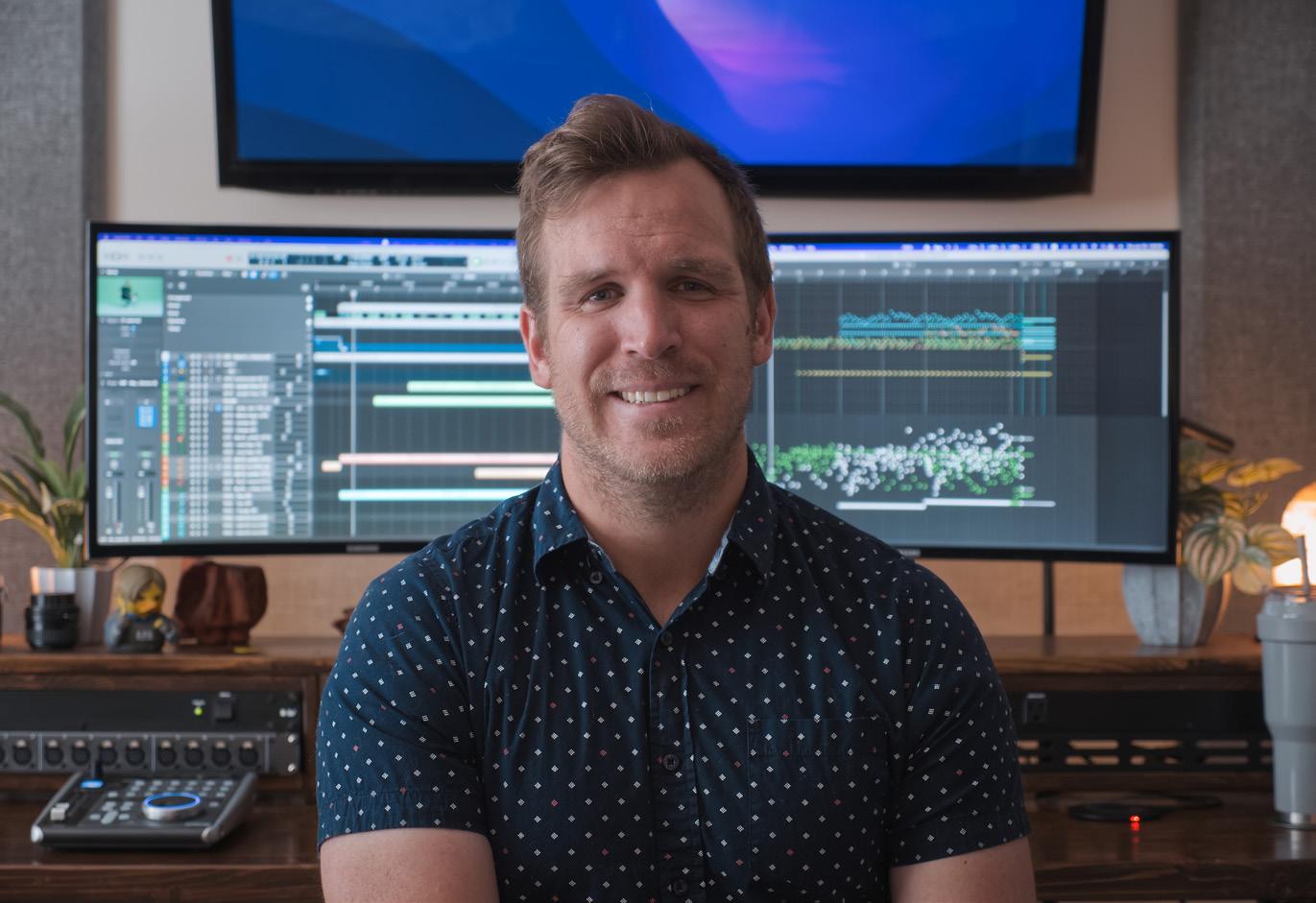

games. In addition to composing, Rakozy has returned to his roots and now teaches a film scoring class at BYU. With their Grammy nomination and skillful compositions, Murray and Rakozy continually inspire the next generation of BYU students to share the light of music through musical composition.
Learn more about Hogwarts Legacy here. Also hear more about J. Scott Rakozy’s “Soaring Over Hogwarts” and Peter Murray’s “All Roads Lead to Hogsmeade” on YouTube.
Click on the Pictures to Watch Rakozy and Murray’s Videos!




By Julianna Charlesworth

Recent BYU graduate Clark Lovell’s journey is a testament to resiliance, faith, and the transformative power of adversity. In a world where success seems synonymous with uninterrupted progress, his story stands out as a reminder of the challenges faced and overcome on the path to personal and professional growth.
Clark’s journey took an unexpected turn during his second year of college when a debilitating injury affected his lip, jeopardizing his rising carreer as a trumpet player. This injury wasn’t just a physical setback but a profound moment of reckoning, forcing him to confront the toll of overcommitment and pushing beyond his limits.
As a dedicated musician involved in numerous ensembles and competitions, Clark was no stranger to rigorous practice schedules and demanding performance expectations. However, the
combination of intense playing hours, a grueling work schedule, and the pressure to excel took its toll. Despite initial signs of discomfort, he pushed through, driven by ambition and a desire to succeed in his musical pursuits.
The injury, diagnosed as an overuse injury with a torn muscle in his lip, forced Clark to reconsider his priorities and career path. Faced with the prospect of losing his ability to play altogether, he made the difficult decision to step back from his musical engagements, including dropping out of ensembles and ultimately changing his major.
This pivotal moment, though initially devastating, became a catalyst for personal growth. Clark’s introspection during this period led him to realize that his injury was not just a physical setback but also a spiritual and psychological awakening. It prompted him to explore new avenues, including starting a podcast focused on musicians who had experienced similar challenges.
The podcast, aptly titled, “Trust the Process”, emerged from Clark’s

Clark Lovell’s podcast, “Trust the Process”.
desire to share stories of resilience and recovery within the music community. It became a platform where musicians from around the world could discuss their own experiences with injury,
rehabilitation, and the mental fortitude required to navigate such setbacks.
Through “Trust the Process”, Clark has not only provided a voice for often-overlooked challenges in the music industry, but also built a supportive community where artists can find solace and inspiration. His podcast tackles topics ranging from injury prevention to the psychological aspects of recovery, offering practical insights and emotional support to listeners.
Clark’s journey has resonated deeply with his audience, drawing listeners from over 25 countries and sparking meaningful conversations within the music industry about the importance of holistic health and sustainable practices. Clark Lovell’s story is one of resilience, transformation, and the power of embracing adversity as a catalyst for personal growth. Through his podcast and advocacy, he has not only redefined his own path but also inspired countless others to approach their own challenges with courage and faith. His long-term vision for the podcast includes expanding its reach, potentially creating educational resources for schools, and advocating for healthier approaches to music education and performance.
Looking ahead, Clark aims to further bridge the gap between musicians, athletes, and entrepreneurs, recognizing the commonalities in their dedication to personal development and resilience. His ultimate goal is to continue fostering a community where musicians feel empowered to prioritize their well-being without compromising their artistic ambitions.




By Julianna Charlesworth

Nathan Cox, a talented cellist who recently graduated from the BYU School of Music, has recently achieved remarkable success in the world of classical music, winning prestigious competitions and gaining acceptance to one of the world’s leading music institutions. When asked who were his most significant mentors or influences in his musical journey so far, he replied, “There are so many; I feel greatly indebted to my wife for her support. My mom I have to thank for making me obsessed with music;... my high school cello teacher, Joseph Mendoes. I’ve been transformed as a cellist under Dr. Kesler [Assistant Professor of Cello at BYU]. Dr. Holden [Professor of Piano at BYU] greatly inspires me... So many professors at BYU have taught me important things about music and the industry.”
Cox’s journey is a testament to his dedication, skill, and the support of his mentors and peers.
Nathan Cox’s victory at the Aspen Music Festival and School Concerto Competition in the low string division is a significant milestone in his musical career. For the competition, he performed Tchaikovsky’s Rococo Variations with the orchestra, a piece that he first auditioned with at BYU when he was fifteen. “It felt like a full-circle moment,” Cox reflected.
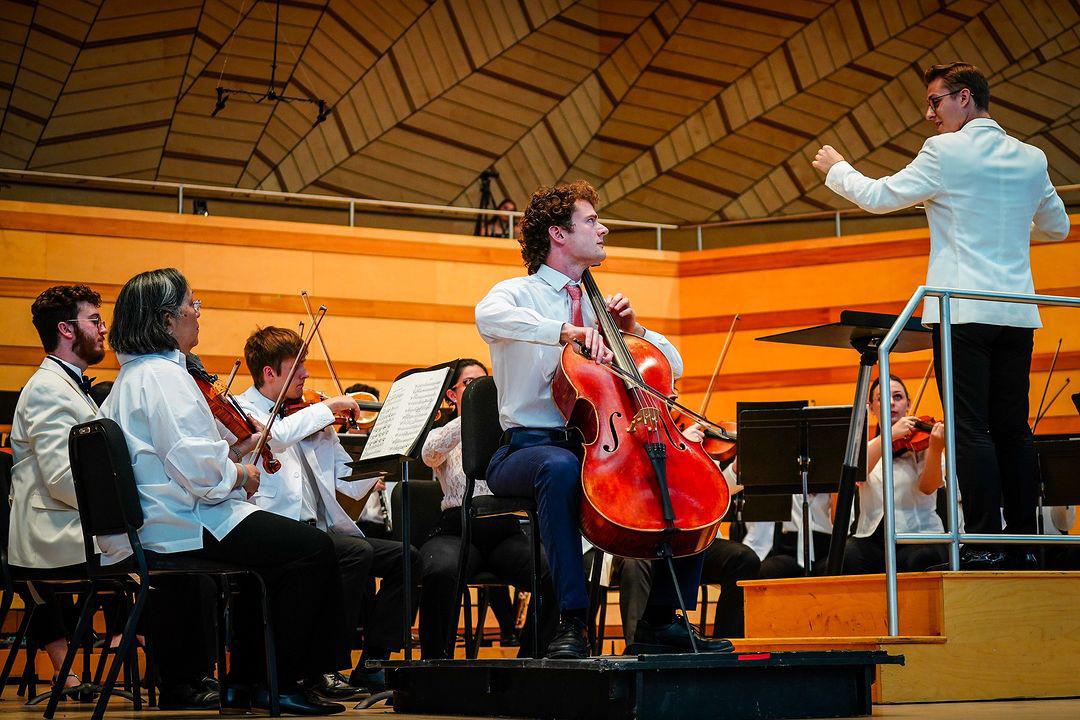
The Aspen Music Festival is one of the preeminent classical festivals in the United States, known
for its intensive eight-week program that includes orchestra rehearsals, private lessons, and elective classes like chamber music. The Concerto Competition at the festival is a prestigious event where instrumentalists compete for the chance to perform with the Aspen Conducting Academy Orchestra. Cox’s win in the low string category was particularly notable, as he competed against students from elite institutions like Curtis and Juilliard.
Cox’s preparation for the festival and competition began in November 2022. He worked with Richard Aaron, a distinguished teacher at Aspen, to prepare his audition materials. “Based on that initial admissions audition, I was awarded the fellowship for the festival; this meant that not only my tuition was free, but also housing and meals,” Cox explained.

Attending the Aspen Music Festival on a full fellowship had a profound impact on Cox’s musical development and career prospects. “I made so many connections with students and important teachers that have already proved helpful as I’ve auditioned for grad school,” he said. These connections have been instrumental in his acceptance to Juilliard, where he will pursue a Master’s degree in cello performance.
Despite his success, Cox faced challneges, particularly managing his nerves during the competition. “My own nerves tend to be the biggest obstacle to my consistency as a performer, and I certainly felt that throughout the competition,” he admitted.
Nevertheless, his performance was a highlight of the summer, made even more special by the presence of his family and then-girlfriend (now wife).
In addition to his accomplishments at Aspen, Cox also won first place at the MTNA Nationals in both the Young Artist Solo String division and the String Chamber Music division. As a soloist, he performed a diverse arrangement of pieces, including Bach’s Sixth Unaccompanied Cello Suite, Piatti’s Twelfth Caprice, Tarrega’s Recuerdos de la Alhambra, and Enescu’s Symphonie Concertante.
His chamber group, the Aspen Grove Trio, performed Shostakovich’s Second Piano Trio and the first movement of Clara Schumann’s Piano Trio, both from memory. “We were the only string ensemble to play from memory; it was a rare achievement and I think it really struck the jury,” Cox noted. The trio’s success was greatly influenced by their coach, Dr. Scott Holden, who encouraged them to memorize their music and enhanced their musicality.
Cox’s nexy chapter begins at Juilliard, where he will study under Zlatomir Fung, a cellist who studied at Juilliard, and Zvi Plesser, an Israeli cellist. “I’m really looking forward to the connections that I [will] make there; I hope there will be really unique performers who will challenge and expand my artistic worldview,” he said.
Reflecting on His Journey
Reflecting on his recent successes, Cox attributes his achieve-
-ments to strategic practice, artistic inspiration, and the support of his mentors. “I practice a lot, I practice strategically, and I try to stay artistically inspired,” he said. He advises young musicians to be open to new experiences and to practice both smart and hard.
Cox’s long-term goals inclide soloing with orchestras and playing in small ensembles. His recent accomplishments at Aspen and MTNA have provided him with the skills, experience, and connections to move towards a career in these areas. As he embarks on his studies at Juilliard, Nathan Cox is poised to make a significant impact on the world of classical music.

“I practice a lot, I practice strategicaly, and I try to stay artistically inspired.”
-Nathan Cox
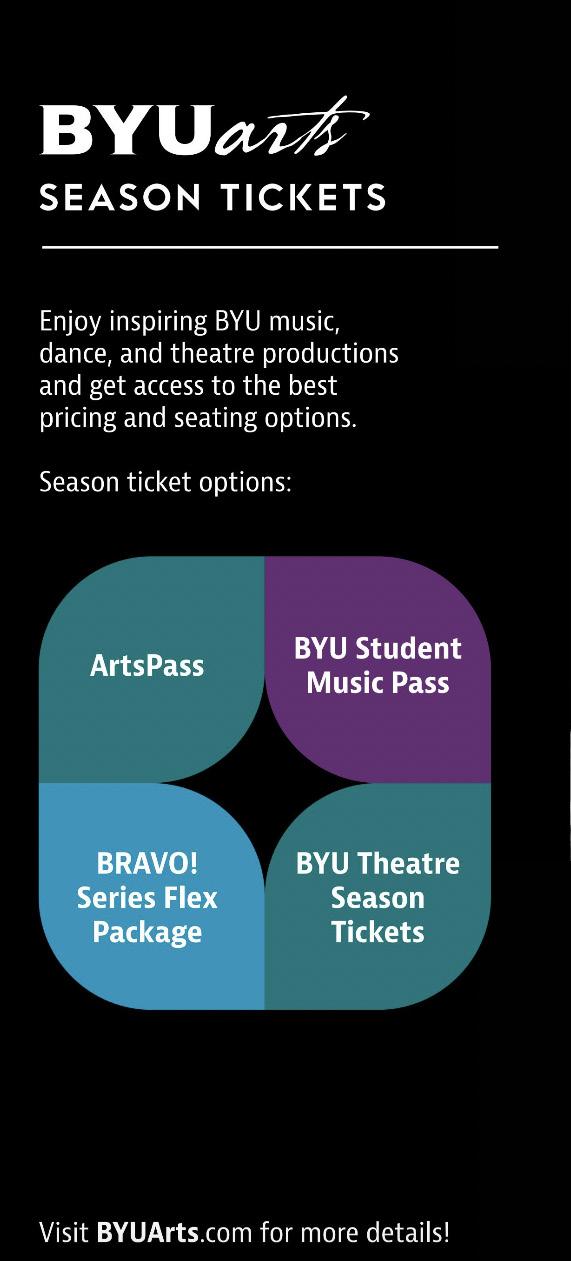


By Andrew Osborn
BYU Jazz Synthesis spent the first three weeks of May on tour in the Netherlands, Germany, and Belgium. While touring, they played at jazz festivals, participated in clinics with high school groups, and played in joint performances with other European Jazz Ensembles.
Synthesis is home to some of BYU’s finest jazz musicians. They skillfully combine swing, blues, Latin, and fusion styles in their performances. For their most recent tour, the group performed seven
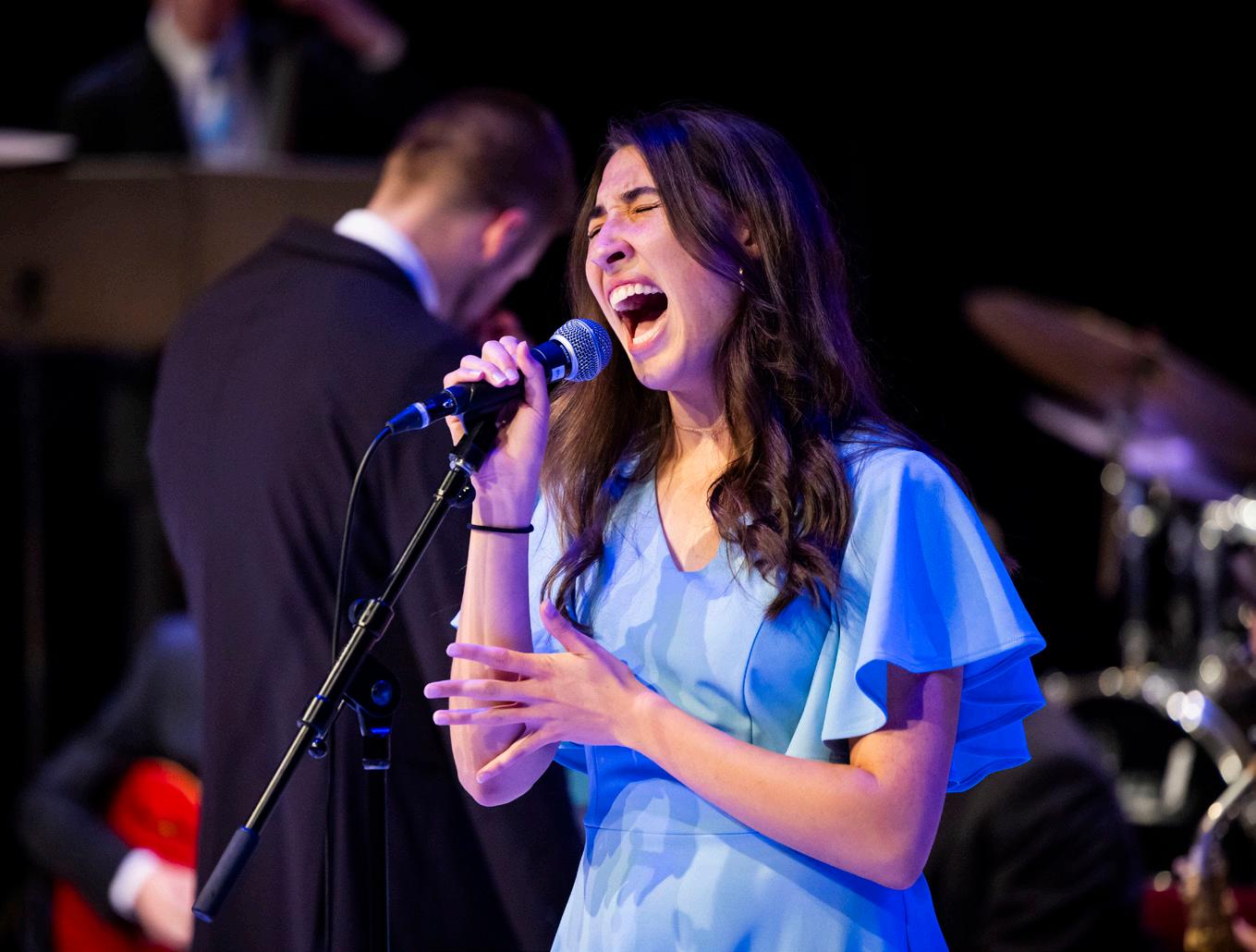
original arrangements that were put together by members of the ensemble. Dr. Ben Nichols, Synthesis’ director, explained that while these arrangements were very personal to the group, the pieces also resonated with audiences in each of the countries they visited. In Brussels, Synthesis was hosted by the European Union Office and the International Affairs Office of The Church of Jesus Christ of Latter-Day Saints for a special performance. They played at a VIP reception with political ambassadors from the EU, Africa, and South America. Elder Jack Gerard of the Europe Central Area Presidency and Sister Jean Bingham, former Relief Society General President were in attendance, and spent time speaking with Synthesis about the importance of bridge building.

From a joint concert with students on a military base in Stuttgart, to workshops with student ensembles in Bad Bergzabern, Synthesis collaborated with local musicians all throughout their tour.
Then ensemble performed at the Trier Jazz Festival, which is located right next to Trier Cathedral, the oldest cathedral in Germany. They even secured an invite to play at the festival again next year!
Nichols noted that the group learned that the world is full of amazing artists and remarked how exciting it was to hear different languages and perspectives from musicians in Europe. “This was really special. It was so fulfilling to see years of work and planning finally culminate in such an exciting and fulfilling experience for the students,” Nichols said.
As Dr. Nichols and Synthesis look to the future, the experiences gained from this tour have undoubtedly shaped their artistic vision and collaborative spirit. This journey not only brought the ensemble closer together but also reaffirmed the importance of music as a vehicle for learning and sharing light with the world.



By Andrew Osborn
BYU’s talented Wind Symphony recently returned from Gwangju, South Korea, after being one of ten ensembles invited to perform by WASBE, the World Association for Symphonic Bands and Ensembles. WASBE is the only international organization completely dedicated to enhancing the quality of the wind band throughout the world, the organization’s website says.

The invitation to perform in Gwangju was a privilege, said Wind Symphony director Shawn Smith. The International WASBE Conference takes place in a different part of the world every two years and ensembles are invited to apply by submitting concert recordings. After reviewing the recordings, the planning committee selects the ten best ensembles and invited them to perform at the conference.
“We certainly feel that we are doing something very special here in music at BYU, but this validation from an international panel of judges means that we are indeed performing at a very high level,” Smith said. The recognition also helps to elevate the respect that BYU School of Music graduates receive as they go out into the world.
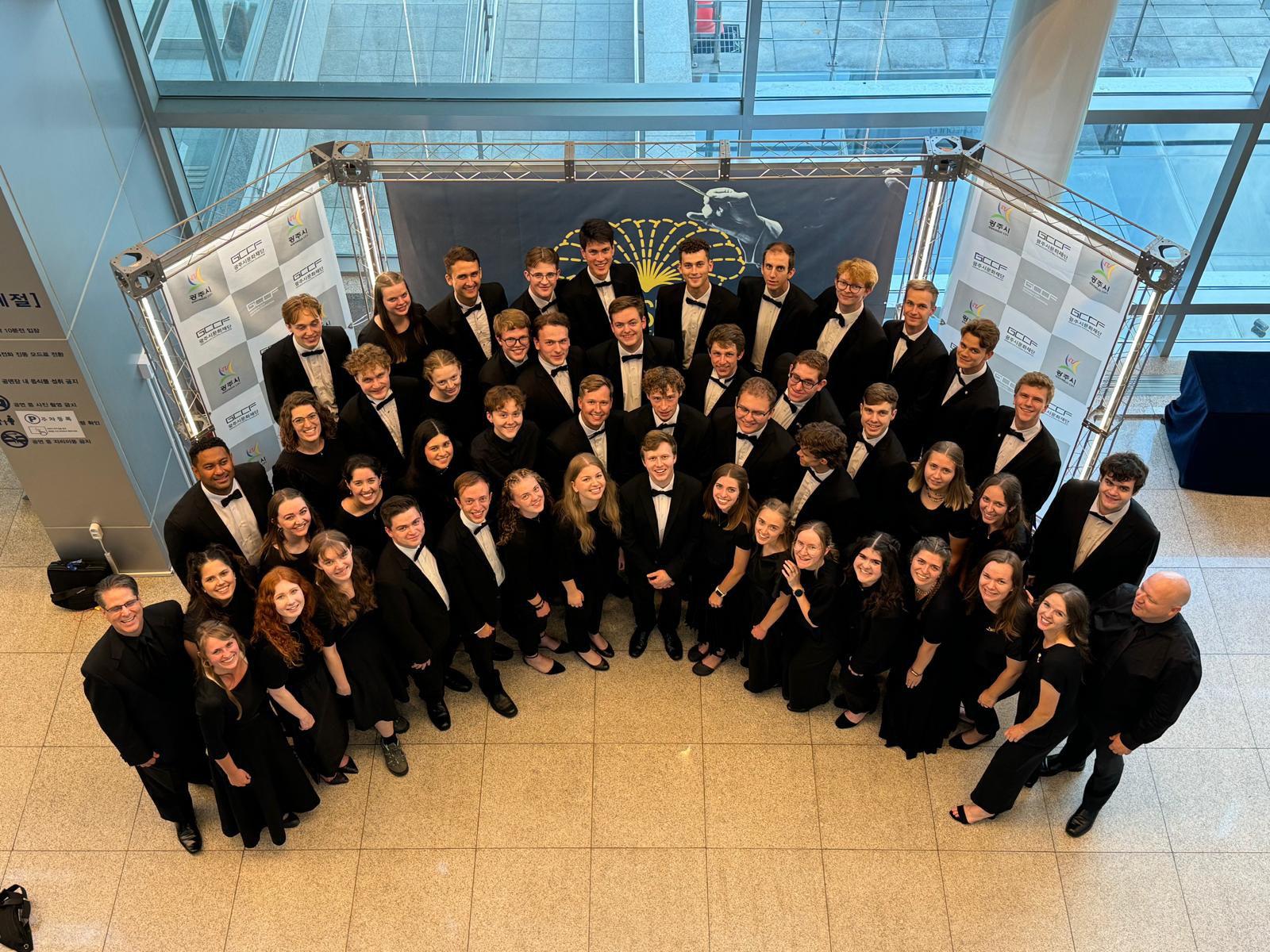

Because the conference was held in the middle of July, two months after the end of Winter semester,
“I told the students that this performance needed to be the best of our lives since the WASBE audience is very musically


sophisticated,” Smith said, “They absolutely rose to the challenge. From the first downbeat to the final release, they played beautifully.”
The concert was fantastic, Smith said. The group was met with enthusiastic praise from the audience and received several curtain calls. One of the highlights from the concert was a performance of George Gershwin’s Rhapsody in Blue by BYU piano faculty member, Jihea Hong-Park.
In addition to the performance, the Wind Symphony also had time to enjoy the unique culture of South Korea, visiting the National Museum of Korea, Korean Folk Village, and several markets. Smith recounted one of his favorite experiences where the entire Wind Symphony dressed in traditional making preparations for the performance was a challenge. Smith sent the students home at the close of the semester with their music and a charge to practice as much as they could by themselves until they met together again in July. The Wind Symphony had four rehearsals together in the two days before they left for Korea and two more once they arrived in Korea.
Korean clothing and toured one of the royal palaces.
The trip had an abundance of miracles, Smith said, one of which took place before the group even left Provo. When a trombonist became so ill that she couldn’t travel, they had to scramble to find a replacement. Nate Seamons, the Associate Director of Bands at BYU, happened to have a friend that played trombone in the Army Band in Korea. His name is Tonga Tukumoeatu and he is a graduate from the BYU School of Music. The Wind Symphony reached out to him and within ten minutes, they had a substitute trombonist ready to perform.
“I simply could not have been more proud of our students. Not only did they perform beautifully, but they were just so great to be with,” Smith said. “Everywhere we went, people told me how impressed they were with our students. People truly sense something special in our students and that is very gratifying.”
The BYU Wind Symphony just performed with the cinematic pop vocal trio, GENTRI, on November 9th and are currently preparing for a 2026 international tour.
“People truly sense something special in our students and that is very gratifying.”
-Shawn Smith
